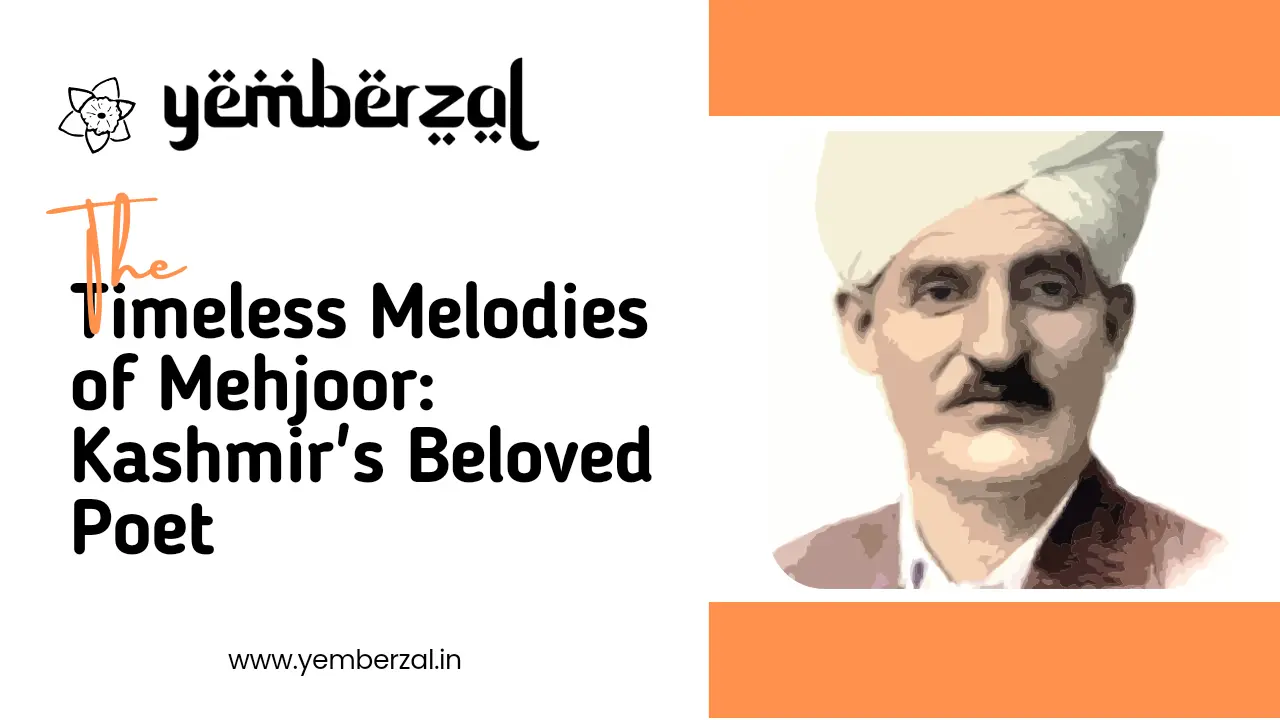The Timeless Melodies of Mehjoor: Kashmir's Beloved Poet
In the breathtakingly beautiful valley of Kashmir, where the majestic Himalayas meet the sky, a poet's voice has resonated for generations, weaving a tapestry of love, nature, and resilience. Mehjoor, the revered Kashmiri poet, left an indelible mark on the literary landscape of the region, his verses continuing to captivate readers and inspire new generations.Born in 1887 in the quaint village of Mitrigam, Pulwama, Mehjoor's early life was shaped by the rustic charm of rural Kashmir. His father, a humble farmer, instilled in him a deep love for nature and the local folklore. Mehjoor's fascination with poetry began with the traditional Kashmiri folk songs and stories recited by his mother, laying the foundation for his unique style that blended classical Persian and Urdu poetry with the rich cultural heritage of Kashmir.
As Mehjoor's poetic journey commenced in his teenage years, his initial works reflected the influences of Persian and Urdu literature. However, it was his exposure to Kashmir's indigenous culture, folklore, and language that truly defined his artistic voice. His poetry became an expression of the Kashmiri people's struggles, aspirations, and deep connection with nature. Mehjoor's verse celebrated the valley's breathtaking beauty, from the majestic chinars to the serene lakes, and lamented the hardships faced by its inhabitants.
Mehjoor's most notable works, "Payam-e-Mehjoor" (Mehjoor's Message) and "Safar-e-Mehjoor" (Mehjoor's Journey), showcase his mastery of various forms, including ghazals, nazms, and masnavis. His poetry transcended mere aesthetics, speaking directly to the hearts of his readers. His words addressed social issues, advocated for women's rights, and reflected the anguish of a people torn apart by conflict and oppression.
Mehjoor's impact on Kashmiri literature extends far beyond his own works. He inspired a generation of poets, writers, and intellectuals, shaping the region's cultural narrative. His legacy has been compared to that of Allama Iqbal, the celebrated Urdu poet, for his role in promoting Kashmiri language and literature. Mehjoor's influence can be seen in the works of notable Kashmiri writers, such as Abdul Ahad Azad, Dina Nath Nadim, and Amin Kamil.
Throughout his life, Mehjoor remained committed to his craft, despite facing numerous challenges. He suffered personal losses, including the death of his son, and witnessed the turmoil that engulfed Kashmir during the 20th century. Yet, his poetry remained a beacon of hope, reflecting his unwavering faith in the resilience of the Kashmiri people.
Today, Mehjoor's poetry continues to be recited in Kashmiri households, schools, and cultural gatherings. The poet's timeless melodies have been set to music by renowned Kashmiri musicians, ensuring his verse remains an integral part of the region's cultural heritage.
In recognition of his contributions, Mehjoor was awarded the Padma Shri in 1951. The Kashmir University has established the Mehjoor Research Centre to preserve and promote his works. The poet's birth anniversary is celebrated as Kashmiri Language Day, honoring his role in promoting the region's linguistic and cultural identity.
Mehjoor's deep connection with nature is evident in his poetry, which often describes the beauty of Kashmir's landscapes. This emphasis on nature served as a metaphor for the human condition, highlighting the fragility and resilience of life.
Moreover, Mehjoor's work addressed the social issues of his time, including poverty, inequality, and women's rights. His poetry advocated for education, social reform, and cultural revival. Mehjoor's vision for a more just and equitable society continues to inspire generations of Kashmiris.
As we close the chapter on Mehjoor's remarkable life and works, his poetry continues to whisper secrets of the human heart. Secrets of love, loss, and resilience, etched in the breathtaking landscapes of Kashmir. His legacy reminds us that art has the power to transcend time and geography, speaking directly to our souls.
Mehjoor's poetry is more than just a reflection of Kashmir's beauty and pain; it's a testament to the transformative power of the human spirit. His words have inspired generations to hold onto hope, even in the darkest of times. They have reminded us that our stories, our culture, and our heritage are worth fighting for.
Today, as we navigate the complexities of our own world, Mehjoor's poetry invites us to pause, reflect, and reconnect with our own humanity. Let his timeless melodies echo through our lives, reminding us of the beauty, fragility, and resilience that binds us all.
And so, Mehjoor's legacy lives on, a beacon of hope in the valley of Kashmir, illuminating the path for future generations of writers, poets, and artists. His poetry, a timeless tapestry woven with threads of love, loss, and resilience, continues to inspire and uplift. As we carry his words into the future, let us honor his memory by cherishing the beauty of our world, standing up for what we believe in, and never losing sight of the power of the human spirit.

Join the conversation